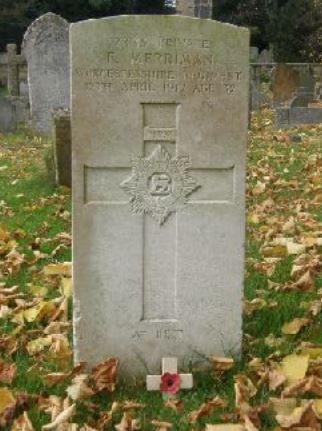2nd Battalion, Worcestershire Regiment

Francis William Merriman was a career soldier who was probably just short of becoming ‘time expired’ when the Great War began and he was recalled to the colours.
He was born in Broad Campden, a village just outside Chipping Campden, Gloucestershire in 1885, the son of George Thomas Merriman (1843-1898), a labourer and his wife Elizabeth (née Tracey; 1845-1932). The couple had nine children, the first born in 1868 and the last in 1891.
At the time of the 1901 Census the family lived at Sheep Street, Chipping Campden and Francis (aged 17) was employed as a labourer.
In 1902 he joined the Army. There is a reference to him being a Reservist in the piece in the Gloucestershire Journal of 14 April 1917 reporting his death. The Army number he received upon joining the Worcestershire Regiment indicates that he enlisted towards the end of 1902. It was common for men to sign on for twelve years, seven to be spent ‘with the colours’ (ie on active service) and five with the Reserve. Assuming this was the case then Francis served with the 2nd Battalion of the Worcesters until 1909 and much of that time would have been spent in India. Thereafter he would have entered the Reserve and the 1911 Census shows him back living in Sheep Street, Chipping Campden, employed as a labourer and as an ‘Army Reservist’. By then he was married.
In 1909 he had married Julia Higgins, an Irish woman, born in Kildorrey, Co Cork and on 26 September 1910 they had their first son, named Francis William George. Two more sons followed, Richard on 18 December 1911 and Thomas August on 21 December 1914.
If Francis’ five year term in the Reserve had commenced towards the end of 1909 he would not have become ‘time expired’ until then and would have been subject to immediate recall when hostilities commenced on 4 August 1914. Unfortunately, no Army Service or Pension records have survived for him to verify exact dates.
The above report in the Gloucestershire Journal states that Francis was a ‘letter carrier’ in Chipping Campden prior to his recall. He was soon sent to France and Flanders (his Medal Roll Index Card states this was on 26 September 1914), where he joined up with his former battalion. As part of 5 Brigade, 2 Division, the 2nd Worcesters were constantly in action in the Ypres Salient during the months of October and November 1914. The newspaper report states that in November Francis injured his left thigh when falling into a shell crater. He spent sometime in hospital before returning to his unit. In the second half of September 1916 the 2nd Worcesters were in the reserve and front lines at Foncquevillers, in the Somme sector. Francis injured his left leg again when he was buried following the explosion of a shell. He was taken to one of the Base Hospitals in France but as his condition did not improve, he was returned to England and to Suffolk Hall Voluntary Aid Detachment Hospital in Cheltenham. His left leg required amputation and although the operation was performed successfully, shortly after he collapsed and died on 12 April 1917: possibly the shock of the operation was too great; he was aged 32. A recently released Pension Record Card gives the cause of death as being the result of the amputation of his left leg. His widow received a pension and also an allowance for their children.
Private Francis William Merriman was buried in the churchyard of St James, Chipping Campden, where a standard CWGC headstone marks his grave. He is commemorated on the Chipping Campden War Memorial.
Researched by Graham Adams 14.9.20
